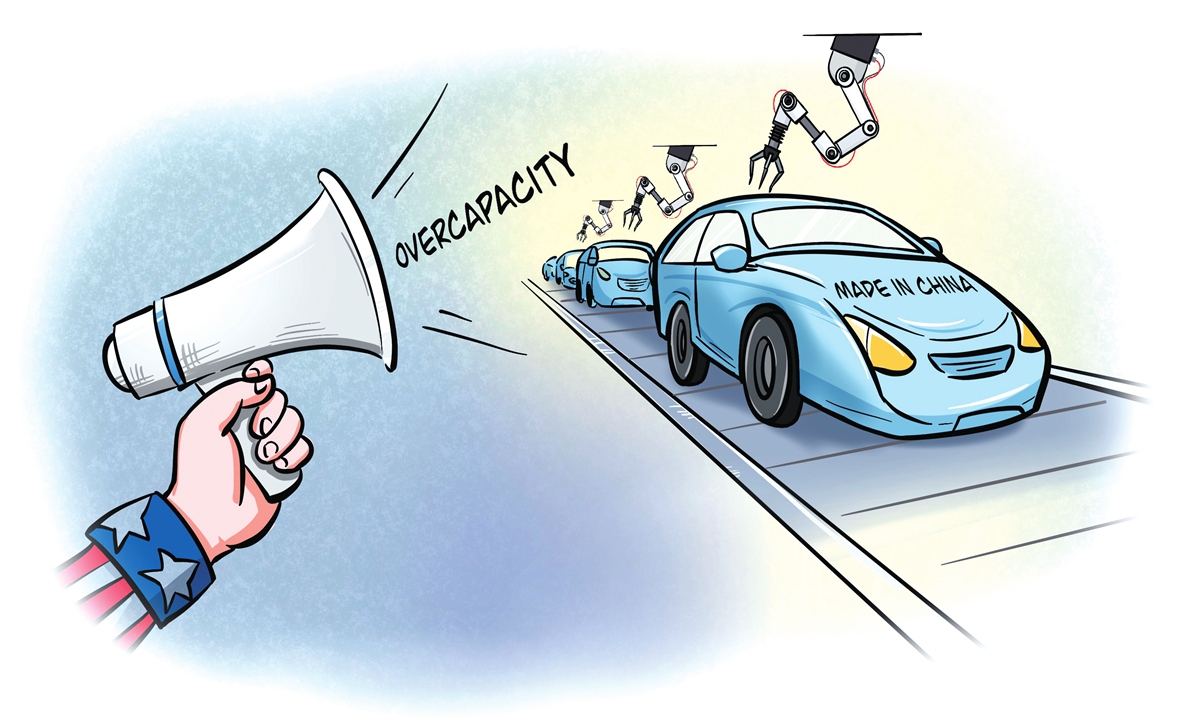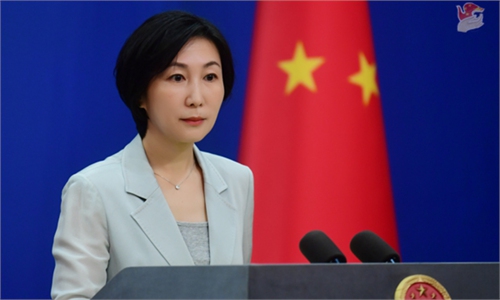Oversupply? Market, not Washington, has the answer

Illustration: Liu Xidan/Global Times
What is overproduction? Who should determine the surplus of a commodity on the international market?
As US Treasury Secretary Janet Yellen has left Beijing, she leaves behind the above two questions that linger in the future of the two country's trade relations and pose a significant challenge to the order of the international market.
The issue at hand is the concept of "overproduction" and who rightfully determines when a commodity is in surplus on the world market.
Industrial overcapacity, or production overcapacity, refers to the production capacity in a particular industry or sector far exceeding market demand.
If the so-called overcapacity issue is assessed based on the global market, the demand for the three major China-made products - electric vehicles, batteries and photovoltaic (solar energy) - is tremendous, and there is no overcapacity at all.
Even the US and European markets have a significant demand for such products. The climate policies of those countries have also indicated that the potential is substantial.
In fact, American consumers' appetite for Chinese goods is undeniable. This preference stems not from a mere whim but from the undeniable value and affordability of Chinese products, a proposition that American manufacturing sometimes struggles to match.
When choosing between two electric vehicles of equal quality, one American-made and the other manufactured in China, most consumers would lean toward the China one, primarily due to cost-effectiveness. In short, China's manufacturing goods can meet the needs of American consumers.
This scenario exemplifies the fundamental principles of a market economy, principles that Washington claims to uphold yet seems to challenge when it attempts to act as the arbiter of pricing, thereby disrupting the very market forces for which it advocates.
The question as to whether there is an oversupply of China-made electric vehicles should be answered by the market and consumers, not unilaterally declared by Washington. It is the same with other China-made products. The market share that China-manufactured electric cars could have - 20 percent, 30 percent, or even more - is not for Washington to dictate.
Any attempt to impose such restrictions inevitably leads to consumers bearing higher costs and governments resorting to subsidizing industries with taxpayer money - an approach historically proven to be unsustainable for industries facing a decline.
This principle holds true for the American market, and the global market at large.
Chinese manufacturing did not achieve its current status overnight or through serendipity; it results from relentless, sometimes painful, efforts, market-driven innovation and a commitment to enhancing product quality and market adaptability.
The global reach of Chinese products, including electric vehicles and 5G technology, contributes significantly to international development and the transition toward sustainability. The presence of Chinese manufacturing in markets from emerging economies to mature markets in the US and Europe promotes social equity and environmental justice, mainly benefiting the growth of emerging economies.
China recognizes that development is the key to lifting more of its population out of absolute poverty and achieving common prosperity. Similarly, Americans should acknowledge that while it may be challenging for Chinese citizens to attain the income levels of their American counterparts, the aspiration for a better life through hard work is a universal right.
The global economy cannot be defined solely by the interests of the US and Europe. Efforts to fragment the global supply chain for geopolitical advantages pose a real threat to addressing the challenges of the 21st century and achieving the necessary cooperation for shared development.
China produces electric vehicles, and Washington says China has produced too many. China exports 5G technology and equipment, and Washington claims China has jeopardized its security. China innovates in artificial intelligence, and Washington says they can't have the chips. China manufactures clothing and textiles, and Washington talks about banning cotton from China's Xinjiang region. So, what can China produce that would be acceptable to Washington? What right does the US have to decide what China can or cannot produce?
Protectionism cannot solve this problem; it only intensifies conflicts. Following closely behind China, many emerging economies rise in the manufacturing sector, such as India, Brazil, Indonesia, and others. The day will inevitably come when products from these countries compete with those from the US and Europe for market share.
The livelihoods of American workers are important, but the livelihoods of workers in China, India and Brazil are equally important. The shift of power begins here, and it is not subject to the West's will.
It depends on order, a reasonable and fair order, an order where everyone negotiates on an equal footing, rather than one party imposing unreasonable hegemonic pressure on the other. This is the only way humanity can progress and the world can develop.
The author is a senior editor with People's Daily, and currently a senior fellow with the Chongyang Institute for Financial Studies at Renmin University of China. dinggang@globaltimes.com.cn. Follow him on X @dinggangchina


